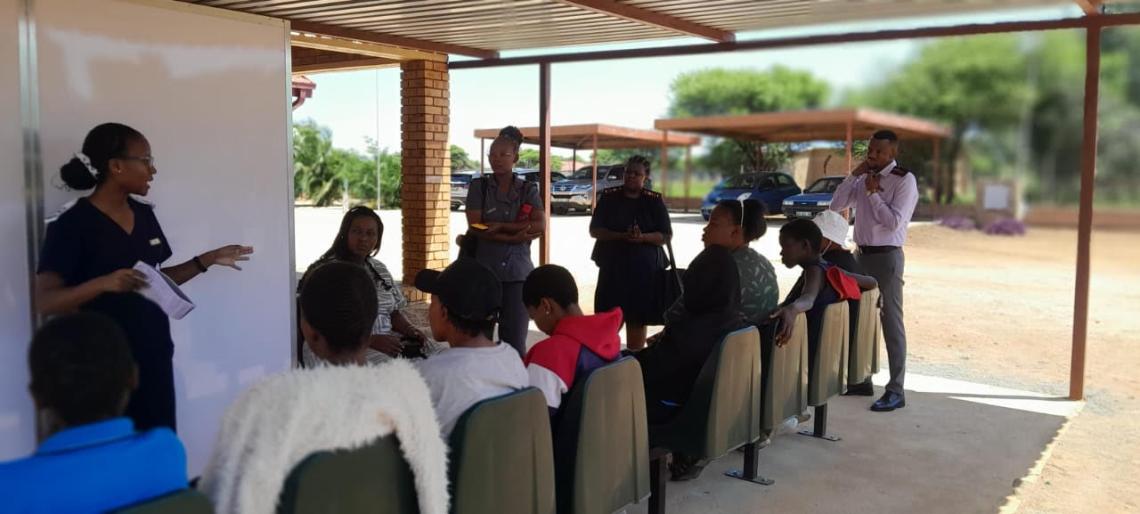Nursing is at the heart of every healthcare system, and strong leadership in nursing education is essential to shaping the next generation of professionals. At the North-West University (NWU), the School of Nursing is led by Dr Rorisang Machailo, a Senior Lecturer and Deputy Director who is passionate about equipping nurses with the knowledge and skills to make a real impact in communities.
We sat down with Dr Machailo to learn more about her journey, the postgraduate programmes offered at NWU, including the Postgraduate Diploma in Nursing Education and the Postgraduate Diploma in Health Services Management, and her insights on the future of nursing in South Africa.

Dr Machailo, could you tell us a bit about yourself and what inspired your journey into nursing and academia?
Dr Rorisang Machailo is the current Deputy Director of the School of Nursing at North-West University, Mahikeng Campus. She is an authentic, values-driven leader who is committed to diversity, equity, and inclusion and brings a wealth of experience in psychiatric nursing, including leadership and management. My journey started as a psychiatric nurse at Tara Hospital. There, I worked in different settings, which included eating disorders and adolescent unit, open and closed wards, including the child and family unit. This is a training hospital and nursing students from colleges (Annlatsky and Chris Hani Baragwanath colleges), 2 universities (Wits & UJ) and SANDF were placed at this institution for psychiatric nursing practice experience. So, I had to orient, teach and assess them during their stay. I also had to take care of the hospital after hours and at weekends. These experiences taught me adaptability, crisis management, leadership and management in nursing. I also worked as a Professional Advisor at SANC in the nursing education department. This experience was important for my understanding of nursing education and the application of legislation in nursing education.
The NWU School of Nursing has become a respected leader in the field. How would you describe its vision and role in shaping healthcare professionals in South Africa?
The school of nursing has positioned itself as one that practices Innovation and Adaptability: We prepare nursing professionals who can adapt to evolving healthcare systems, technology and global health challenges. We contribute to equity and advocacy, including nurturing professionals who champion access to care, health equity and the rights of the vulnerable populations. We believe in collaboration and teamwork through creating a workforce that values interdisciplinary collaboration for holistic care. The school engages in research that informs clinical care, education and policy. We engage in scholarly activities in established areas of expertise to exhibit a spirit of inquiry in all academic activities. The school of nursing builds and inspires future leaders who can influence policy, improve systems, and mentor the next generation. Our academic staff and clinical facilitators provide high-quality teaching, clinical supervision and role modelling. They shape curricula and competency frameworks which are aligned with community healthcare needs.

Could you share more about the Postgraduate Diploma in Nursing Education, who it is designed for and why it’s important in today’s context?
Nursing Education is a specialist field that focuses on education and training students who are undertaking undergraduate and postgraduate programmes in nursing. A Nurse Educator is a Professional Nurse with an additional qualification in Nursing Education and is registered as such with the SANC. The PGDip (Nursing Education) will serve to strengthen and deepen the student's knowledge in nursing and Nursing Education. The primary purpose of the qualification is to enable working professional nurses to undertake advanced reflection and development, and to train student nurses of different categories. The nurse educator will provide high-quality nursing education, which meets the needs of the country in terms of quantity, quality and relevance. A Nurse educator can work/function as a lecturer, clinical educator, education management, researcher and specialist. This qualification enables the nurse to engage in scholarly activities in an established area of expertise to demonstrate skills in critical thinking, writing and development of arguments.
Similarly, what are the key outcomes of the Postgraduate Diploma in Health Services Management, and how does it equip graduates to take on leadership roles in healthcare?
The Postgraduate Diploma in Health Services Management programme is values-driven, based on the constitutional values of human dignity, equality and freedom. Key outcomes include, amongst others :
- Graduate engagement in planning, commissioning and managing a specialist unit, an educational entity or a health service.
- Graduate participation in the development and implementation of the strategic and operational plans, including key institutional policies.
- Initiates innovative projects based on regular evaluation and review of the strategic plan for achievement of its goals, utilising the process of change management.
- Establishes links with the external local, regional, national and international environments to achieve best practice and a healthy competitive position.

This qualification will enable the graduates to function as a clinically focused, service-oriented, independent registered professional who is able to lead, work autonomously, innovatively and render comprehensive nursing care across all spheres of health. The Health Services Manager Specialist scope will include management of nursing practice, nursing education, professional development, nursing research, nursing leadership and quality improvement services. The program will produce graduates with competencies and skills developed through critical thinking, clinical practice and research in areas of nursing practice, who can function as part of a team or independently, as leaders or consultants. The PGDip Health Services Management will enable both horizontal and vertical articulation opportunities on the premise that the graduate meets all the minimum entry requirements of the chosen articulation pathway.
NB: The competencies of Nurse Educator overlap with Nurse Manager as they pursue programmes which are non-clinical specialisations and have over-arching competencies with clinical specialisations.
Why do you think postgraduate education is vital for the nursing profession at this stage in South Africa’s healthcare landscape?
Postgraduate education is vital for the nursing profession because it strengthens the profession’s impact, credibility and ability to respond to complex health needs. Postgraduate programs equip nurses with deeper clinical knowledge and advanced skills. The programs improve the quality and safety of patient care. These programs prepare nurses for leadership roles in healthcare systems, policymaking and administration, including training them to lead teams, manage resources effectively and influence decision-making at higher levels. Postgraduate education expands nurses’ scope of practice, giving them more independence in clinical decision-making. Postgraduate nurses are better prepared to handle emerging health issues such as pandemics, chronic disease management, and mental health crises, as well as building resilience and adaptability in a rapidly changing healthcare environment. Postgraduate education prepares nurse educators who can teach and inspire the next generation and ensure the sustainability of the profession through high-quality training and mentorship. It also raises the profession’s profile and strengthens its voice in multidisciplinary healthcare. It offers opportunities for personal and professional growth, enhances job satisfaction and retention by opening new career pathways. Finally, it improves the global mobility and competitiveness of nurses.
Therefore, postgraduate education in nursing is not just about individual advancement; it is about building a workforce capable of leading, innovating, educating and advocating for better healthcare systems worldwide.

How is NWU ensuring that its graduates are not only clinically competent but also socially responsive to the needs of South African communities?
The academic programs and curriculum activities of NWU are developed to help students achieve the desired attributes. The nursing curriculum reflects current nursing and health care trends, including community and societal needs, to prepare graduates for practice in a complex, dynamic, multicultural health care environment. NWU promotes teaching, learning and innovation, including fast-tracking blended learning. We pride ourselves on maintaining knowledge of professional practice needed to help students prepare for contemporary nursing practice. The pedagogical paradigm in NWU is to educate students by providing them with broad information with a view that the student should reach a point where he/she can be seen as a well-rounded, broadly orientated, intellectual and critical capacity to embark on a life-long, values-oriented path of interaction with knowledge and views about reality and their application to various contexts. The nursing school in NWU offers students opportunities to acquire the critical, evaluative and research skills to be able to form a coherent understanding in different contexts, and to develop into lifelong learners who will flourish in an uncertain world.
What advice would you give to nurses who are considering pursuing postgraduate studies but are unsure if it’s the right time?
Align your studies with your long-term professional vision. Approach postgraduate study not just as a qualification, but as a journey of personal and professional growth. Postgraduate education is demanding—mentally, emotionally and financially. Be realistic about balancing studies with work and family responsibilities. Connect with peers and networks that provide encouragement and collaboration. Manage your time effectively, use technology and study strategies to stay organised.
What does your role as Deputy Director of the NWU School of Nursing entail on a day-to-day basis?
It is about ensuring that the curriculum is developed, disseminated, implemented and evaluated as per rules and regulations. It is also about the fair distribution of work for those implementing the curriculum. The students are the main stakeholders, and we need to be fair, give them the necessary support and guidance to ensure that they reach their goals of being dedicated and competent professionals. As the deputy director, I oversee the staff within the school (academic and support). The staff within the nursing school must have values such as care, compassion, integrity, respect for human dignity and accountability. All these form the foundation for providing safe, person-centred and ethical care to all patients.

What has been the most rewarding part of your career so far?
To see the number of nursing students graduating and completing the nursing degree. It is a special and proud moment for both the nurse educators and the parents. Also, seeing the school of nursing excel in teaching and learning, both students and staff. Many staff members are being promoted. The school of nursing participates in World Skills competitions every two years, and we had the privilege of representing the country and Africa in succession in 2022 and 2024. It is a proud moment for everyone involved in nurses’ teaching and learning. In 2025, we are currently preparing and participating at the national level of the same competition. Our academic staff participate in the North West Department of Health Nursing Excellence Awards. These awards are held annually, recognising the best in Nursing Education and Practice. The school have won both the best nurse educator and the best student award in the last two years, respectively. The students who represented South Africa in the world skill competitions have all won the special minister’s award in the last two years. The school also have a senior lecturer who has been nominated to participate in Teaching Advancement at Universities (TAU), which is a prestigious achievement. Winning the HERS-SA award for the Women in Academic Administration Category 2025 was a cherry on top. The school of nursing is at its peak!
What qualities do you believe make a great nurse?
A great nurse combines clinical competence, human compassion, and professional integrity. The ability to truly care for patients, understand their struggles and treat them with dignity makes patients feel seen, valued and safe. The ability to assess situations quickly, make sound clinical judgments, and respond to emergencies effectively. Working effectively with doctors, allied health professionals, and fellow nurses. Taking initiative, guiding others, and standing up for patients’ rights inspire confidence in both patients and colleagues. Respecting confidentiality, practising honesty, and making decisions guided by professional values builds trust and strengthens the credibility of the profession.

If you could describe nursing in three words, what would they be?
Caring, compassion and values
Finally, what message would you like to share with students who are thinking about joining the NWU School of Nursing?
The school of nursing is fully accredited with SANC and CHE to offer both undergraduate and postgraduate programs. The school provides high-quality teaching and learning and promotes innovation, including fast-tracking blended learning. We use educational technologies to support and enhance the teaching-learning process. We facilitate and implement a variety of teaching strategies appropriate to student needs, desired student outcomes, content and context. Come join us because it all starts!



